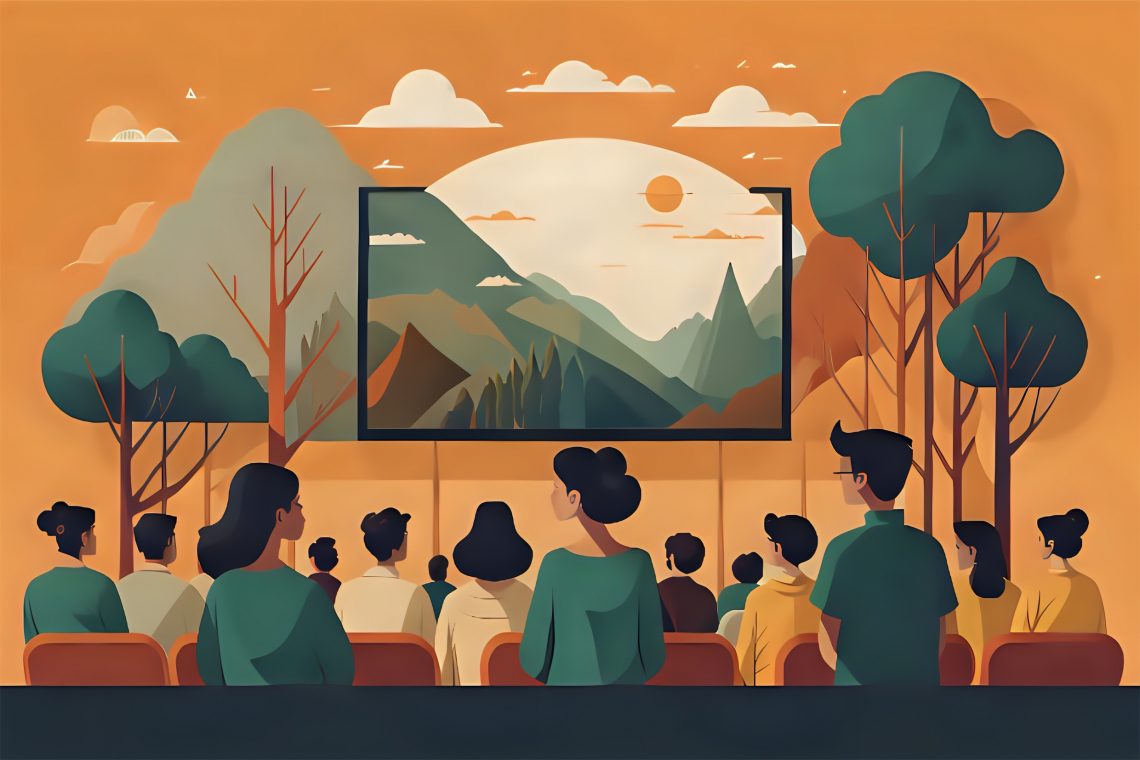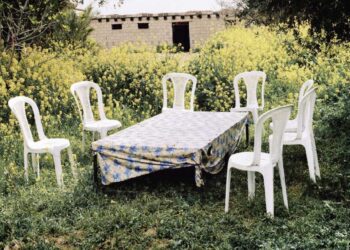For the past fifteen years, the Arab Film Festival in Berlin “AlFilm” has been dedicated to addressing issues and concerns from the Arab world from the perspective of its various inhabitants, introducing these perspectives to the German audience, especially Berliners, and moving beyond superficial or orientalist narratives. This year, it returns from April 24 to 30 to celebrate its fifteenth anniversary, fostering dialogue and understanding between Arab and German cultures through diverse Arab cinema productions.
Palestine in mind
Palestine has always been part of the festival since its inception. “AlFilm” has dedicated itself to showcasing Palestinian cinema in Berlin, drawing films from Palestine that have appeared in prominent international film festivals and have garnered prestigious awards. “For many reasons, these films are rarely shown on big screens in Germany, thus ‘AlFilm,’ as an Arab film festival, plays a vital role in showcasing them and providing a platform for Palestinian filmmakers to voice their stories in the country,” Festival director Pascale Fakhri explains.
This year, the festival opens with “Bye Bye Tiberias,” a documentary by Lina Soualem. This French, Palestinian, Belgian, and Qatari co-production (2023), shown for the first time in Berlin, narrates the personal story of Lina and the experiences of women over four generations, depicting their struggles, hopes, and fears – a story that intimately recounts the history of Palestine and profoundly portrays its people’s experiences with displacement, dispossession and exile, through archival footage, old family videos and photographs.
After premiering at the Venice International Film Festival, the film has been showcased at numerous festivals globally, winning several awards, including Best Documentary at the London Film Festival and the Jury Prize at the Marrakech International Film Festival. This marks Soualem’s second feature film.
Fakhri notes that over the years, the festival’s audience was invited to engage with pro-Palestinian perspectives on the Arab-Israeli conflict. “The narrative of Palestine and its people’s struggles are, and will remain, essential in shaping Arab identities. The festival thus provides a space for its audience and guests to engage in open and respectful dialogues about these topics,” she adds.
This edition of the festival takes place amid criticism aimed at German authorities and the Berlin Senate for silencing pro-Palestinian voices. According to Fakhri, “The festival has created a safe haven for discussing and addressing the Palestinian issue in Berlin, free from the constraints of the prevailing German narrative. It offers an unrestricted forum to explore this matter, without any barrier or taboo, from the firsthand perspectives of those who experience it.”
This year’s “Spotlight” section, titled “Here is Elsewhere: Palestine in Arab Cinema and Beyond,” highlights Palestine’s significant regional and global influence, beyond its regional sovereignty. The festival explores the various ways in which Palestinian aspirations and struggles are portrayed through personal stories, expressions of solidarity, and self-explorations of identity, featuring a mix of Arab and international films, including works by Jean-Luc Godard and Costa-Gavras.
Fadi Abdelnour, co-founder of the festival and a member of the organizing committee emphasizes the importance of the festival and its robust backing institution, particularly at this time. “Without the festival, Arab and Palestinian narratives would be extremely limited,” he notes. “This festival is crucial today not only for its content but also as a platform for solidarity and empowerment for the Arab community, which has been actively involved in political and solidarity movements with Gaza amid the ongoing six-month-long war. With their focus on these pressing issues, they find themselves less able to dedicate time and energy to preserving their identity.”
A notable addition to this year’s festival lineup is “Palestine – A Revised Narrative,” a 30-minute film produced by the festival and scheduled for screening on Sunday, April 28, at Silent Green Cultural space. This film, composed of silent footage shot by British forces in Palestine from 1914 to 1918, is accompanied by a special sound design by Rana Eid and music composed by Cynthia Zaven.
Fifteen years
“AlFilm” began in 2009, driven by those passionate about the Arab cinema industry and its significance in shaping public awareness and culture. It aimed to present diverse representations of the various cultures within the Arab region, as seen through the eyes of its residents and filmmakers. The festival has grown annually and received sustainable funding twice, in 2020 and 2024, from the Department of Culture and Europe at the Berlin Senate.
This year, the festival celebrates its fifteenth anniversary with a special program entitled “AlFilm: 15 Years of Arab Cinema in Berlin,” which includes a panel discussion in collaboration with AfriCamera, to be held on Friday, April 27, at the Transtopia Cinema, focusing on Arab and African perspectives in the current German cinematic scene.
“The festival has thrived over the years thanks to the dedication of its staff, their passion and interest, and the enthusiastic response of the audience and its turnout, even during years without funding, which was sufficient to sustain the festival and allow the organizers to continue with small support,” Abdelnour notes.
Regarding the significance of the festival, Abdelnour states that “In recent years, the Arab Film Festival in Berlin has emerged as the city’s sole annual Arab cultural event that consistently improves and develops not only as a festival but also through its institutional efforts and audience engagement. It has also gained a notable reputation in the Arab world as a unique event, distinguished by its content and format.”
He adds, “The significance of this festival is growing, especially at a time when many hesitate to showcase Palestinian, or sometimes Arab and Muslim content. There’s a sense of apprehension regarding the potential challenges they might encounter or the possibility of limited audience engagement. Several events canceled in the past six months didn’t solely revolve around Palestinian issues, nor were they exclusively critical of Israel. Instead, they were called off due to their Arab and/or Muslim association.”
The festival operates with a small, committed team that believes in its mission and role to enhance the Arab cultural scene in Berlin and Germany. This team strives to convey this message and communicate with its audience in Berlin and neighboring cities, as well as to cultivate a new audience eager to learn about the Arab world and its issues.
The festival’s identity
“The festival has solidified its position as one of the prominent festivals in both Europe and the Arab region by presenting films that reflect the perspectives of Arab communities alongside those of minorities and diverse cultures,” Fakhri explains.
The festival focuses on showcasing the diverse facets of the Arab region, including its cultural, religious, political, and gender diversity. Over the past fifteen years, it has successfully done so, drawing on the experiences of people deeply rooted in Arab cinema and experts in the field.
Fakhri adds, “Through a collective of cultural and cinematic activities, the festival aims to address the underrepresentation or misrepresentation of Arab cinematic content in Berlin which often does not reflect reality. It also seeks to foster discussion about the challenges and opportunities facing Arab cinema.”
The festival has evolved over the years and attracted a new generation of immigrants who identify with the festival’s principles, aims and representations, as Fakhri explains. “There is also a special relationship that has developed between the festival and immigrant directors living abroad, particularly in Berlin, making the festival a platform for showcasing their work and hosting them in discussions and workshops related to their specialties.”
Fakhri insists that the festival, which this year takes place in six cinema halls displaying its fifty films, “presents a different image from the one portrayed by the German and European media in general about Arabs. The festival is crucial for the non-Arab audience for the same reasons, offering a different and complex narrative that engages with various topics concerning the Arab world and opens space for discussions with filmmakers. It is significant for the film industry as it discusses its development and the real-life issues faced by communities, in addition to addressing financing and production both inside and outside the Arab countries.”
The Arab Film Festival in Berlin is a festival for the masses that engages directly with its audience to convey its message. It is not a platform for handing out awards or hosting judging panels. Instead, the festival seeks to present authentic portrayals of Arabs and the region, offering perspectives that come directly from the people and places they represent.
Program overview
The “Film Selections” section of this year’s festival highlights the rich diversity of contemporary Arab cinema with films produced over the past two years, showcased in a special section titled “Persona Non Grata” or “Undesirable Persons.” This segment emphasizes stories about marginalized and oppressed individuals grappling with socio-economic, racial, or gender issues that contribute to stigma and marginalization. These films not only depict personal struggles but also portray attempts at resistance, crossing borders, and sharing personal narratives.
This year’s edition also includes several masterclasses, panel discussions, and film talks, culminating in a closing ceremony on Tuesday 30 April at Gretchen. This event will feature live audio-visual performances by Arab and Palestinian artists, organized in partnership with the cultural collective “Al. Berlin.”
The festival also includes films from Sudan, such as “Goodbye Julia” directed by Mohamed Kordofani. The film narrates the story of a northern Sudanese woman who inadvertently causes the death of a man from southern Sudan. Wracked with guilt, she seeks redemption by offering asylum to Julia, the deceased’s widow, and her son, and employing Julia as a domestic servant in her home, setting the stage for a complex and unconventional relationship.
Another significant work is the documentary “Life is Beautiful,” which chronicles the experiences of filmmaker Mohamed Jabaly who attended a film festival in Tromsø, Norway, in 2004, when a war broke out in his home country, Palestine, specifically in Gaza. He grappled with fears that haunted him, turning his life into a nightmare for his family, amid worries of potential expulsion by the Norwegian government, deeming him stateless. However, his colleagues, friends, audience, and peers in the Norwegian film industry united to support his pursuit of justice.








